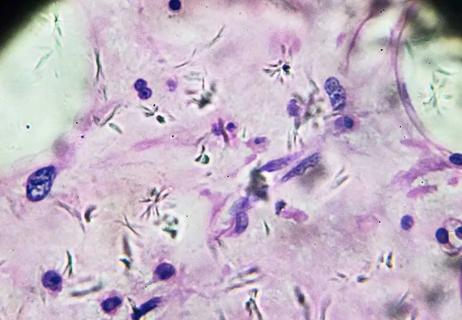If you experience these symptoms, it’s time to talk to your doctor

One of the tricky things about detecting and diagnosing some early-stage cancers is that, often, they don’t actually cause any symptoms, and if they do, they’re symptoms that are also commonly associated with a number of other causes and conditions.
Advertisement
Cleveland Clinic is a non-profit academic medical center. Advertising on our site helps support our mission. We do not endorse non-Cleveland Clinic products or services. Policy
This is one reason why it’s important for people to establish a primary care doctor who they visit annually, says cancer care nurse Josette Snyder, BSN, MSN, AOCN.
A doctor who knows your history and has a running record of your health can help determine whether changes to your body warrant testing or a visit to a specialist.
Snyder discusses what signs and symptoms you should watch out for.
While all of the symptoms below could very well be benign or unrelated to cancer, Snyder suggests that they definitely be brought to the attention of your doctor.
It’s often impossible to tell a benign cyst from a malignant tumor just by looking at it, so be sure to have any lumps on your breast, neck or genital areas checked out.
If you notice other changes to your breasts like dimpling, discoloration or discharge from your nipples, talk to your doctor. It could be a sign of breast cancer.
Make sure you perform a skin check on yourself regularly. Pay attention to any moles that are asymmetric or change in shape, color or size as that could be a sign of skin cancer like melanoma.
Use this guide when doing a skin check:
Advertisement
If you tend to have infection after infection or are constantly dealing with fevers, it could be a sign that your immune system is compromised by lymphoma or leukemia.
We all have diarrhea or constipation from time to time. But if you notice a significant change in how often you go to the bathroom, then it’s time to talk to your doctor.
This can include more frequent urination or always feeling like you have to go, as well as blood in your stool or urine. These changes can signal colon, prostate or bladder cancer.
You’ve dropped a few pounds without trying. Should you be worried? It’s best to check with your doctor and explain what symptoms you’re experiencing like a loss of appetite.
Unexplained weight loss could indicate that certain types of cancer have spread.
That feeling that food is stuck in your throat? It happens.
But if that feeling, as well as trouble swallowing, lasts for more than two weeks, it can be a sign of cancers of the mouth, throat or esophagus.
Pay attention to any sores or lesions in your mouth that cause pain. If they’re persistent, it could be a sign of oral cancers.
This is especially common in those who smoke or consume alcohol heavily.
Bumping into the edge of the table may result in a bruise — that’s normal.
But if you have certain blood cancers, you may start to notice bruises in abnormal spots on your body.
Talk to your doctor if you experience odorous vaginal discharge. Your doctor may want to screen for ovarian cancer.
Also, if you experience persistent pain and changes in your menstrual cycle, it could be a sign of cervical, uterine or ovarian cancer.
While you may feel bloated during your period, but if you’re bloated for more than two weeks, it can be a sign of ovarian cancer or gastrointestinal cancers.
A chronic cough or hoarseness — that lasts more than two weeks — could be a sign of lung cancer.
And if you’re coughing up blood or also experience chest pain or shortness of breath, don’t wait to reach out to your doctor.
If you experience any of these symptoms, be sure to log them in some way, so that you can have a thorough conversation with your doctor about how often symptoms occur and how long they’ve been happening.
Symptoms like unexplained weight loss or changes in your bathroom habits can have many causes by many different things.
“That’s why it’s important to talk to your doctor about any symptoms that don’t go away or last more than two weeks,” says Snyder.
Early detection is key in detecting cancer before symptoms appear.
Advertisement
For several forms of cancers, there are screenings that can detect them before any symptoms occur. It’s recommended that you get these regular screenings:
Most health insurance plans cover at least some preventive screenings, so check with your insurance provider. There may also be free screenings offered by hospitals or organizations in your community.
It’s important to pay attention to your body and how you feel. While these symptoms are also commonly associated with several other causes and conditions, it’s vital that you speak to a doctor, especially if symptoms are persistent.
Your doctor can run tests, including a biopsy, if necessary, where a piece of tissue is removed and tested.
“The bottom line with any of these symptoms that may be worrisome is for you to work with a doctor to help you sort out concerning symptoms,” advises Snyder.
Advertisement

Sign up for our Health Essentials emails for expert guidance on nutrition, fitness, sleep, skin care and more.
Learn more about our editorial process.
Advertisement

Prioritize protein and fresh produce, but be extra careful to avoid bacteria that could cause foodborne illnesses

Here’s how (and why) to ask your doctor about treatment goals, second opinions, clinical trials and more

Rates of early-onset breast, colorectal and GI cancers are increasing, but preventive care and a healthy lifestyle can help reduce your risk

The side effects of cancer and treatment can impact desire, sexual function and intimacy, but there are ways you can keep the flame going

Decisions you make regarding smoking, alcohol use, meal choices and exercise can make a big difference

Taming fear and reclaiming your future after treatment

Carcinomas are the most common and affect skin and organs

7 healthy eating tips to help reduce your risk of some of the most common types of cancer

Even small moments of time outdoors can help reduce stress, boost mood and restore a sense of calm

A correct prescription helps your eyes see clearly — but as natural changes occur, you may need stronger or different eyeglasses

Both are medical emergencies, but they are very distinct events with different causes